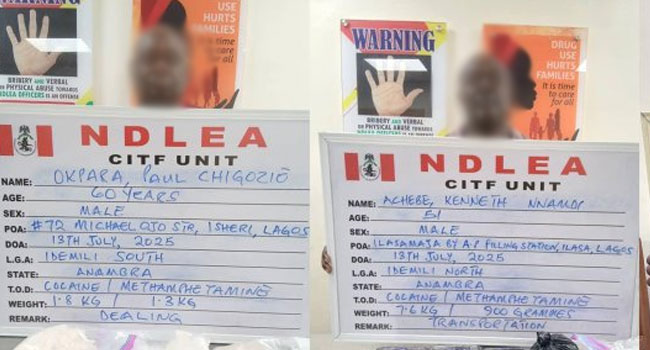For six long years, a 60-year-old man believed to be one of Nigeria’s most elusive drug traffickers managed to stay one step ahead of the law. That run finally ended on Saturday, July 13, when officers of the National Drug Law Enforcement Agency (NDLEA) stormed his hideout in Isheri, Lagos, and arrested him.
It was a moment of triumph for the NDLEA — and a major development in Nigeria’s ongoing struggle to contain drug trafficking.
“This arrest is a big win,” said Femi Babafemi, the NDLEA’s Director of Media and Advocacy, who confirmed the operation in a statement released Sunday. “We’ve been tracking him since 2019.”
How It All Unfolded
The arrest didn’t happen overnight. It came after a carefully planned operation based on what Babafemi described as “credible intelligence.” At exactly 5:45 a.m. on the day of the arrest, NDLEA operatives intercepted one of the suspect’s couriers driving a white Toyota Sienna along the Apapa-Oshodi Expressway in Lagos. He was reportedly en route to Onitsha, Anambra State — a known trafficking corridor.
Inside the vehicle, agents found a hidden stash of drugs — 7.6 kilograms of cocaine and 900 grams of methamphetamine — carefully concealed within the car’s compartments. To find the drugs, the NDLEA brought in sniffer dogs. The dogs didn’t fail.
Armed with this evidence, officers quickly moved on to the kingpin’s residence in Isheri. There, they discovered even more drugs: 1.8 kilograms of cocaine and 1.3 kilograms of methamphetamine. The suspect, whose name has not been made public yet for legal reasons, was arrested on the spot.
A Wider Crackdown
But the operation in Isheri was only part of a broader sweep by the NDLEA in recent days — one that paints a worrying picture of the size and sophistication of Nigeria’s drug networks.
At the Murtala Muhammed International Airport in Lagos, NDLEA agents teamed up with Aviation Security staff from the Federal Airports Authority of Nigeria to stop an Italy-bound passenger on a Turkish Airlines flight. His luggage contained 7,790 pills of tramadol and Rohypnol — powerful sedatives often misused as recreational drugs.
The passenger confessed that he bought the pills in Nigeria, hoping to sell them in Italy at a higher price.
Then, just a day later, NDLEA officers working at the airport’s export shed intercepted 17 parcels of skunk — a potent form of cannabis. This time, the drugs were hidden in packs of a popular breakfast cereal and were meant to be part of a larger shipment to Pakistan.
Drugs on the Highway
Drug seizures weren’t limited to airports either. On Wednesday, NDLEA agents operating along the Onitsha-Enugu expressway arrested a 30-year-old man found with 45,000 pills of tramadol.
And in Taraba State, officers nabbed two suspects in the Gassol Local Government Area. They were carrying 10,000 capsules of tramadol and a small quantity of cannabis.
A Growing Crisis?
The NDLEA’s recent operations highlight a deeper issue — the growing reach of drug trafficking networks within and beyond Nigeria. From the highways of the South-East to the departure halls of international airports, these traffickers are finding new ways to move their products.
It’s a challenge that the NDLEA, under the leadership of Brigadier General Mohamed Buba Marwa (retired), has been trying to tackle head-on.
Experts say the problem goes beyond arrests and seizures.
“There needs to be more focus on drug demand reduction, education and rehabilitation,” says Okechukwu Ibe, a public health advocate in Abuja. “We can’t arrest our way out of this crisis.”
What Comes Next?
For now, NDLEA’s latest bust sends a clear message: the agency is watching — and closing in.
With the arrest of one of its most wanted suspects, the agency has struck a significant blow against organised drug crime. But as the growing list of seizures shows, the war is far from over.
Still, in a country where drug abuse is often linked to wider problems — from insecurity to youth unemployment — every success counts.
And for the NDLEA, this latest victory is not just a win in court; it’s a win for the future.




